Successful Donor Management for Churches
Successful Donor Management for Churches
No church can accomplish its goals without generous giving. The situation really is that simple—and yet, as anyone who’s worked on the financial side of ministry knows, managing the funds entrusted to a church can be a daunting, intimidating, and frankly overwhelming challenge. Especially when your accounts never feel full enough to accomplish everything you’d like.
So much of what you achieve as a church is grounded in your finances, and your finances are largely dependent on donors. Put two and two together, and it’s clear that managing your donors isn’t just one small aspect of your leadership’s responsibilities, but a vital task that you can’t afford to mishandle.
Unfortunately, donor management is neither a simple nor straightforward task. Every individual giving to your ministry is unique, with a different background, ability to give, willingness to engage further, desire to take on larger responsibilities—the list goes on and on. The point is, there is no silver bullet for churches looking to improve their donor management strategies, because each church and congregation is so unique.
But there are some tried-and-true strategies that every church should take advantage of. We’ll walk through many of them below, and explore what information and tools can help you effectively build a healthy financial future for your church, while ensuring your donors feel engaged, fulfilled, and appreciated through their donor journey.
TOUR PUSHPAY’S DONOR MANAGEMENT PLATFORM
How Do I Manage My Donors?
If you want to touch the hearts of your congregation, you’ll need to learn effective donor relationship management strategies. Perhaps the most important mental leap you should make is to think of donor management as a relationship. Like all relationships, this one should be built on honesty and transparency, which is going to require you to do something most of us are uncomfortable with: Talk about money.
There’s nothing wrong or unusual about feeling slightly awkward. Our society has stigmas against the open discussion of our finances. But you know what doesn’t shy away from the topic of money, wealth, and generosity? The Bible! By some counts there are over two thousand mentions of finance in scripture.
As you do in all other aspects of your life, follow the Bible’s lead and be forthright about your church’s finances. Once the subject is being discussed in an open and respectful manner, every other step on your donor management journey will become easier.
We’ve already mentioned how each member of your congregation is unique. The way they approach and progress in their donor journey will be equally unique, and you should do everything possible to provide them with a personalized experience.
You can’t deliver a unique sermon to every member of your congregation on Sunday morning (though you probably wish you could!), but you can find dozens of other ways to engage on a more personal level. Individual communications—especially a personalized note of thanks for gifts—are a great way to connect. Consider setting up fundraising opportunities for specific projects so that a donor feels more connected to the ministry they’re supporting. Invite congregants to events or encourage them to volunteer; they’ll self-select into the activities and services they’re most attracted to. And when you can catch them one-on-one, be sure to ask for their feedback on their experience with different aspects of your ministry, and do your best to incorporate those notes moving forward.
That amount of work would be overwhelming for anyone. But you don’t have to tackle it alone. Be sure to engage your leadership and administrative team to lighten the load of donor management—just make sure everyone has some training before you ask them to write thank you notes or take feedback from your congregants.
What’s more, donor management software can handle a significant amount of that workload. Church management software like Pushpay’s can host a database of your congregation, and give you easy insights into donor history, engagement, and where givers are on their donor journey—all of which can inform how you should be connecting with your congregation, both individually and as a whole.
How Can I Increase My Donor Satisfaction?
This may seem obvious, but don’t fall into the trap of only discussing donations when you’re asking for them. Many well-meaning church leaders will request funds to keep their ministry running smoothly, but then don’t communicate the specifics of how those gifts are making an impact.
The key here is transparency. Potential donors and current donors alike want to know how their funds are being allocated. They wouldn’t have given to your church if they didn’t trust you to be good stewards of their gifts, so prove to them you’re using every dollar efficiently to improve your ministry and community.
This doesn’t always have to be a dry conversation, full of spreadsheets, ledgers, and KPIs from your donor database. Make sure you’re celebrating the wins! When you hit an online fundraising goal for a specific project or event, share the news joyfully, and be sure to include and acknowledge everyone who made that success possible. Effective donor engagement through personalized notes of thanks go a long way to inspire recurring donations! Meaningful donor interactions are essential to establish a positive donor relationship.
Speaking of personalization, be aware of and make sure to acknowledge those donors whose financial gifts go above and beyond the norm. These key donors are the first people you’ll turn to whenever big projects develop in the future; simultaneously, if enough of them were to suddenly stop giving, your ministry’s finances could collapse virtually overnight.
This does not mean that key donors should be placed on a pedestal above those without the means to give more. But you should make sure these donors know they’re appreciated, that their feedback is important, and how important their generosity is to your church.
Of course, all of this transparency and personalized communication becomes a lot easier with the right tools in place. Not only can donor management software track contributions to specific ministries and projects, but it empowers you to communicate quickly and easily with custom groups based on dozens of factors. What’s more, Pushpay’s church management software allows your team to send customizable thank you notes to those donors who are making your good work possible.
What Is A Donor Strategy?
A donor strategy is your unique plan to put all of the above into effect. They’re the concrete steps you’re taking to attract, engage, and retain donors moving forward. The goal is to nurture current donors and attract new donors to support future fundraising efforts.
As you’ve likely noticed, everything that’s been discussed so far is dependent on your church’s individual characteristics. Smaller congregations make individual connection easier than a Sunday service with over a thousand worshippers. You may enjoy a balance of regularly engaged givers, or be reliant on just a handful of key donors. Perhaps your congregation is happy to give and simply trusts you to allocate the funds responsibly, or maybe they’re most energized by contributing to specific projects and appreciate constant progress reports.
Point being, you’ll have to base your donor strategy on the factors unique to your church. There are, however, a couple universal strategies to embrace:
Taking advantage of accurate donor information and data is essential to maintaining and boosting generosity. These days, with a powerful analytics and donor dashboard such as Pushpay’s, you’re able to track insights into how all your users are engaging with your ministry. See which groups individuals and families participate in, how often they’re engaging with your digital platforms—and significantly, where they are on their donor journey. Our church donation software can automatically identify New Givers—as well as those who are At-Risk or have Lapsed—to help you nurture every stage of giver.
There’s one other secret weapon that every donor strategy should include. Recurring Giving is, without a doubt, one of the most powerful donor tools for driving church donations. This option—usually facilitated by a digital giving platform—automatically schedules your donors gifts on a regular, customizable schedule.
There are several benefits to Recurring Giving for your church and donors alike. Having a consistent sense of when and how many donations are arriving adds stability to your church’s finances. It also eliminates the chance that, for whatever reason, a regular giver accidentally misses a donation on their usual schedule. Donors overwhelmingly appreciate this feature—if they have nothing to remember, they have nothing to forget!
But most significantly, Recurring Giving is proven to increase total donations. On average, a recurring giver will donate over 40% more than givers who only initiate individual gifts.
So then, how do you implement Recurring Giving? Pushpay’s offers online giving for churches to simplify the process for both your users and administrative teams—and will even nudge your regular givers to consider making their gifts Recurring. Explain the system and its benefits to your congregation, and get them on board with committing to your ministry consistently. An added bonus is the ability to keep track of church tithes and church offerings. Once they’ve embraced this simple and powerful tool, it’ll be one less responsibility on their plates, and more consistent funds for your church.
How Do You Attract New Donors?
It’s always easier to maintain existing donors than replacing them with new givers, but just like you need a strategy for existing donors, you need a plan for attracting new donors as well.
Lots of churches talk about the metaphor of their church’s “front door” as a first-time visitor’s gateway toward worship, participation, and eventually giving. Savvy leaders, however, have discovered that the front door has shifted to online experiences. In recent years—and especially in the post-COVID era— many first-time guests to Sunday service will have already engaged with a church’s digital presence several times before attending in person.
The importance of an engaging, streamlined, and up-to-date digital presence is a critical first step for attracting new donors. Remember, most of your first-time guests are on the younger side, and thus are likely to engage through websites, apps, and digital giving platforms. Make sure your platforms are polished, or risk losing potential donors before they’ve even physically visited your church.
Once you’ve engaged a guest, remember that they are coming from a different giving mindset than your regular donors. They’re probably not going to be immediately invested in your church, leadership team, or vision. Thus it’s even more critical to illustrate exactly how their gifts are being utilized.
Also consider setting a low entry point for a first-time contribution as a way to encourage those who haven’t yet dipped their toes into giving, potentially around a campaign with quick turnaround and tangible results. And remember, once they’ve made that first donation, make sure your new giver receives an immediate, personalized note of thanks.
The importance of donor management cannot be overstated, regardless of the financial health of your church or where the majority of your congregation is in their donor journey. It’s not only critical to accomplishing your ministry’s goals, but the act of giving is an intensely personal sacrifice on the congregant’s behalf and needs to be acknowledged. If donor management advice could be boiled down to a single idea, we’d simply encourage your church to be transparent, thankful, but also joyful at every stage of your congregation’s shared experience of giving.
And, as always, we’re here to help. All of Pushpay’s technology is built on the belief that mission-based organizations need great software, specifically designed to advance your ministries and ensure the success of your mission. To learn more about how we can help your church—especially in regard to donor management—schedule a call with one of our experts today.
Featured Content
You May Also Like

